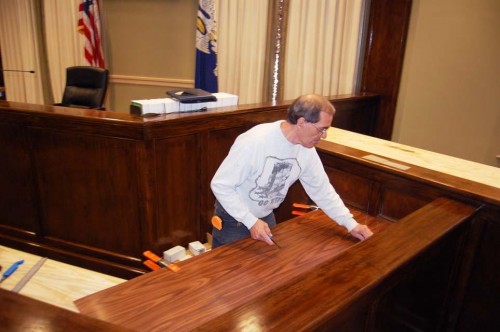
Lafourche courthouse back in business
November 3, 2009Nov. 5
November 5, 2009Banks in south Louisiana learned their lessons from the local recession of the 1980s well, said MidSouth Bank President and CEO Rusty Cloutier Monday in Thibodaux, speaking at a meeting of the Bayou Industrial Group.
Now, banks in the rest of the country are going to have to learn from the nation’s current financial crisis, he said.
MidSouth is a community bank based in Lafayette with offices in Cut Off, Morgan City, Thibodaux and Houma.
“In the 1980s, Louisiana, Texas and Oklahoma had the worst economic crisis here,” said Cloutier, a Morgan City native. “We made loans that should’ve never been made.”
The nation’s current financial crisis-including GMAC’s need for another bailout and the bankruptcy announcement Sunday of large commercial lender CIT-has built up over the last 12 years. Big banks are the ones to blame, Cloutier said.
“It was a disgrace to humanity how it happened,” he said.
Former Federal Reserve Chairman Alan Greenspan was singled out.
“He brought us to the brink of an economic crisis…Greenspan never met a big bank he didn’t like,” Cloutier said.
Greenspan misdiagnosed Louisiana’s economic woes in the 1980s, tracing them to the increased cost of deposit insurance when lower energy prices were the cause, he said.
Cloutier, who is a former director of the Atlanta Federal Reserve’s New Orleans branch, said he warned Greenspan that the national economy was headed for a fall.
“We would have to mortgage the entire country to save a few of (his) friends,” he said.
In his talk, Cloutier continued to warn of the dangers involved with big banks, citing a report that half of all Americans are dependent on Bank of America for their financial future.
He also traced the country’s financial problems partly to another individual, former Citigroup CEO Sandy Weill, saying Weill pushed to break down barriers between traditional banking, investment banking and insurance that had existed since the Great Depression.
“In banking, we make a small profit because we take a small risk,” Cloutier said.
Weill acquired Travelers Insurance when the company went bankrupt after Hurricane Andrew slammed Louisiana and Florida in 1992. Then he looked to Citigroup, Cloutier said, wanting to merge banking with investments and insurance.
Greenspan gave Weill the go-ahead to merge the three, believing the law prohibiting the action would change, according to Cloutier, who was appointed to the Security and Exchange Commission’s Advisory Committee on Small Public Companies in 2005.
Other actions, such as former President George H.W. Bush in 1992 urging all Americans to buy homes, helped lead to the country’s economic crisis, Cloutier said.
“I told them about Louisiana, Oklahoma and Texas,” he said. “I said real estate can go down quickly.”
Toward the end of 2007, Cloutier could see the situation worsening. President Barack Obama and his Treasury Secretary Tim Geithner are following the same plans pursued by Bush administration officials, he said.
“We’re still allowing companies to get bigger, but local banks are good,” he said.
That’s a result largely of the lessons learned from the 1980s. When the price of a barrel of oil hit $140, the economy in south Louisiana did not get carried away, Cloutier said, even though the federal government wanted to know why Louisianans were being so conservative in the face of the good times.
“We’re not going down this road again,” he said. “Bank customers here have been cautious, they’re not leveraged up. We have cut back when we needed to. We have not let the boom take off. … I know how much suffering we went through in the 1980s.”








